Programme 3 | HI Future
The third programme of public engagement focused on HI Future, a pre-existing project from Noisy Cricket. From 2017 to 2023, this social enterprise has worked to connect people affected by homelessness in Greater Manchester with businesses, government, and charities to support them in returning to work.
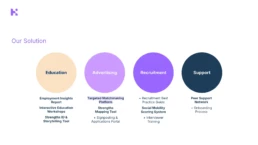
Working with 15 people who had experienced homelessness - along with organisations like the Co-op Group, the Department for Work and Pensions (DWP) and the Manchester-based charity, the Booth Centre - Noisy Cricket researched the main barriers that make employment difficult for people experiencing homelessness.Learning that the main barriers to employment were actually on the employer's side, key issues included workplace attitudes that undervalue people with lived experience, rigid hiring processes that favour candidates without gaps in their CVs, and a lack of understanding about the support needed by those recovering from trauma.By working with the community plus organisations across the public, private and social sectors, HI Future was developed as a recruitment solution to improve social mobility. It focuses on people’s natural strengths—rather than just their past education, training, or job experience—to match them with roles and industries they might not have considered before.

Skills like strong communication or curiosity can be valuable to employers dealing with skill and labour shortages, especially after Brexit and the pandemic. HI Future’s Targeted Matchmaking Platform helps organisations discover talent they might usually overlook, helping both employers and people impacted by homelessness achieve safety and security.Machine learning has further potential to help match people impacted by homelessness with roles where their strengths can help them succeed, while also helping employers find suitable new candidates more effectively. Yet, Noisy Cricket wanted to carefully explore the ethics of using AI to support disadvantaged and vulnerable people in returning to work.The PEAs involved in Programme 3 include Sunday Ekpo (MMU), Alex Mbabu (University of Salford), Md Mustahid Salam and Cathal O’Reilly (University of Manchester). Members of the project team Keeley Crockett and Sara Linn (MMU) plus Lauren Coulman and Mooch Ashley (Noisy Cricket). The PEAs had interdisciplinary expertise covering AI, data science, digital and engineering.
Instead of just raising awareness around how AI might affect people impacted by homelessness, the HI Future Programme of Public Engagement encouraged the PEAs to look at how taking action could make a real difference. As a result, the PEAs were asked to focus on ways to reduce the risks and maximise the benefits of using machine learning in social mobility recruitment.
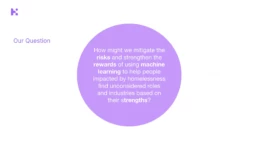
The research findings offered a chance to shape the future of HI Future’s work in promoting inclusive and supportive employment. Noisy Cricket asked the PEAs to consider cultural barriers, structural obstacles, and personal challenges that might affect how AI is used ethically.
For example, some of the potential risks of using AI include that it could lead to more personal profiling of people affected by homelessness or make it harder for those with limited digital skills to find jobs. However, AI could also offer rewards, like making it easier for people to find roles that match their strengths and improving their chances of securing a job.
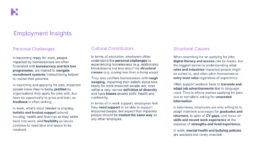
Before engaging with communities, the PEAs were asked to identify their assumptions and hypotheses about the issuesaffecting the HI Future project, such as (1) homelessness, (2) employment for homeless people, and (3) recruitment technology.
Noisy Cricket also helped the PEAs understand the power dynamics between (A) the academics, (B) Noisy Cricket, and (C) potential employers in their responses to the HI Future brief.
Exploring Power Dynamics
To help the academics better engage with people affected by homelessness throughout the HI Future Programme, Noisy Cricket held a series of workshops to help them understand how power and privilege shape our views on homelessness and employment.
The PEAs explored:
- Who is accountable and responsible for recruitment and AI ethics in the HI Future program, and who should be consulted and informed about its potential impacts during the Public Engagement Programme.
- Mapping their shared goals, objectives, and values in exploring the project, and any challenges or opportunities that could affect their ability to respond successfully.
- How to address the assumptions and ideas they developed about AI ethics in social mobility recruitment when working with people impacted by homelessness.
- Reflecting on the wants, needs, and hopes of people affected by homelessness in using machine learning to help them find jobs that match their strengths.
- What steps should be taken to make sure the community’s voice is central, trust is built, and value is created for the people involved in the HI Future Program.
By examining who influenced the choices and opportunities for people affected by homelessness, the PEAs were able to approach their work more thoughtfully and deliver their research with greater sensitivity at each stage of the Public Engagement Programme.
Reaching and connecting with people impacted by homelessness requires researching community groups, charities and government services that help these individuals find work. In Greater Manchester, several organisations provide education, training and job support.
We learned that the Job Centre and Greater Manchester Combined Authority’s (GMCA) Changing Futures initiative, as well as Business in the Community, Mustard Tree and the Booth Centre, all offer services that help people become ready for work. These included CV workshops, confidence-building sessions and employer work experience placements.
Noisy Cricket’s connection with GMCA led to an introduction to Back on Track, a charity which focuses on impacted people’s existing skills and strengths to create meaningful learning and development opportunities. Initial conversationshelped identify one of Back on Track’s goals of enhancing their members’ sense of citizenship.
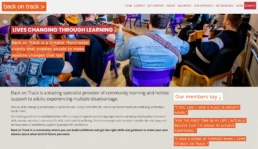
Exploring individual and shared goals, it was agreed that the HI Future project would be beneficial for everyone involved, because:
- It allowed people affected by homelessness to learn how to advocate for themselves and recognise the value of their lived experiences when shaping services aimed to impact their lives
- It offered a learning opportunity for PEAs to experience community engagement
- It gave Noisy Cricket the chance to explore the ethics of using machine learning in HI Future
After informally agreeing to collaborate, we worked closely with Back on Track’s services manager and frontline staff to figure out the best ways to connect with and recruit participants. The goal was to sign up 6-8 people interested in helping with the research and design of a solution to address the risks and maximise the rewards of using machine learning in strengths-based recruitment.
Back on Track suggested two key approaches: (1) hosting in-person events to raise awareness about the program and (2) providing takeaway materials explaining what participation would involve, how to sign up, and the potential benefits for participants. Noisy Cricket, MMU and the PEAs were also encouraged to deliver a (3) sign-up and Q&A session for anyone interested in joining.
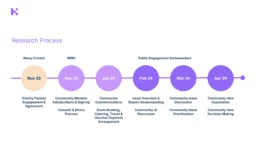
The PEAs first created a plan and timeline for delivering the HI Future project. This included key activities, desired outcomes and tangible outputs to guide how they would encourage Back on Track’s members to participate and engage in the research and design process.
For the first in-person event at Back on Track’s Day Centre, the PEAs decided to balance presenting information with facilitating conversation. They shared details about AI ethics in general and the HI Future opportunity for strengths-based recruitment. They illustrated the potential impact of AI by using examples from people’s daily lives.
Members were also invited to share their thoughts on AI and their experiences with recruitment and ask questionsabout the project. To support the session, the PEAs created and printed one-page posters summarising the presentation provided, written in plain English and broken down into digestible chunks of information for accessibility.
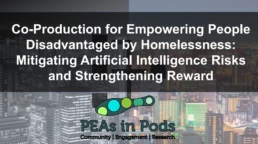
The posters outlined the project’s purpose, plan, and sign-up process, along with the potential benefits of taking part, as advised by Back on Track’s services manager. During the event, a date was set for a follow-up sign-up session two weeks later, to coincide with additional programme activity taking place at the day centre.
The MMU team took the lead, ensuring that safeguarding as well as ethics and consent were at the heart of the process. Following Noisy Cricket’s safeguarding policy – using a values-led approach to building respectful and responsible relationships – the approach prioritised the mental and emotional well-being of community members.
This included providing recommendations for additional support services if needed. MMU’s approach to ethics and consent included information on participation activities, compensation and data privacy, requiring agreement on having read the information, attending sessions and anonymous recording of audio, visual and written information.
Considering Ethics and Consent
In ensuring members of the community were taken care of, and that the data collected and used to to communicate was handled in line with data legislation (e.g. GDPR), MMU and Noisy Cricket worked with Back on Track to protect both the community members who choose to participate and academics in working with them.
MMU and Noisy Cricket ensured:
- Safeguarding and support measures were in place for the people participating in the research should they need support beyond the scope of the project
- Informed consent frameworks were utilised so that community members were clear on what the research involved, any potential benefits and risks as well as the right to withdraw from the research at any time
- Transparency and accountability through conversation and documentation around why the research was being conducted and how it will be used, plus managing expectations around the long-term aims of the project
- Inclusivity through reaching, engaging and balancing the voices of diverse groups, and that information shared and explored is relevant and accessible, as well as facilitation of voices is equitable, especially with marginalised groups
- Rigour in designing ongoing ethical research approaches and methodologies, to respect the social and cultural factors influencing communities, and considering potential biases which might influence the research process
- Reduction of risk through monitored research performance, from adhering to data privacy regulations and minimising unintentional harms to navigating complex situations and addressing power imbalances, to avoid legal issues and support academics in learning and evolving best practice
The sign-up process was designed to follow data protection regulations, ensuring Back on Track members’ information was safe and not misused. It also assured participants that their rights were respected and clearly explained their choices about taking part, helping them make informed decisions.
Compensating Communities
Community members were paid £15 per hour for their time using One4All vouchers, which could be spent online or in stores. Refreshments, including lunch for full-day sessions, were provided. Public transport costs were covered, and there was a budget for taxi expenses for people with disabilities who needed them to get to the venue.
The community research, which began with an onboarding session in December 2024, was followed by monthly workshops from February to April 2024. The PEAs working on HI Future led four community research workshops, with up to six participants per session, held at Back on Track.

The PEAs were responsible for creating the session plans, setting goals, organising activities and deciding roles and responsibilities. Their tasks included hosting workshops, facilitating discussions, creating presentation slides and capturing insights. Each of the four PEAs rotated roles in each session to gain experience in different tasks..
Onboarding Session 1 (January 2024)
In the first session, the PEAs revisited the key issues raised during the Introductory Session for the HI Future project with the community members in December 2024. The main topics discussed included concerns about the companies that control AI platforms, worries about data privacy and sharing and fundamental questions about trust.
During an open discussion, the community members pointed out that while AI uses data in ways that can reduce people to just numbers and often benefits the organisation more than the users, they also agreed that even human decision-makinginvolves some level of assumption. They saw AI as simply another tool to help solve problems.
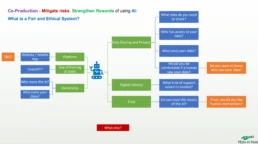
During the discussion, which was led and recorded by the PEAs, the community members agreed that AI can be either helpful or harmful, depending entirely on how it’s used and the intentions of those in charge. When it comes to using AI to support employment for people impacted by homelessness, the community members believed AI could be useful in helping them find jobs.
Workshop 2 (February 2024)
In the second workshop, the PEAs summarised what they had learned from the community members so far and delved deeper into how AI might be used in recruitment. The PEAs also outlined their own assumptions about what might matter most to the community, including fear around data bias, cultural stigma and personal employment histories.
To keep the discussions relevant, the PEAs shared research on how current AI recruitment uses. They talked about AI tools for job matching, creating CVs, and suggesting training. They also explored how HI Future could use machine learning around people’s inherent strengths to recommend new job roles and industries for those affected by homelessness.
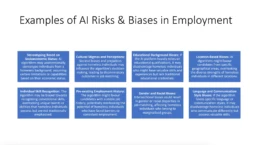
The session showed that the PEAs’ assumptions didn’t match what the community members felt was most important. One key concern was how tools like HI Future could practically demonstrate that people are a good fit for new jobs. Another important point raised was the need for psychological support for people going through the job recruitment process.
Workshop 3 (March 2024)
In the third workshop, the PEAs sense checkED their understanding of the needs raised by community members to date, and work with them to priortise focus areas around which to ideate solutions. Using the Socio-Ecological Model, PEAs were able to make clear the wider context of the community members requirements for ethical usage of AI.
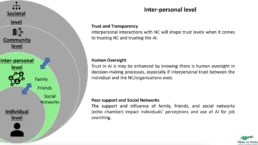
The community members made it clear that, on a personal level, trust and transparency between HI Future, employers using the platform, and job seekers is crucial. However, on a broader community level, practical demonstration of employment potential and caring for people’s psychological safety during the recruitment process were most important.
They were then asked to choose which of the two topics they wanted us to focus on when creating solutions. The top priority was showing people’s strengths in a practical and meaningful way. This is because, without clear proof of how someone’s skills can bring value to a workplace, it may be harder for them to get hired.
Workshop 4 (April 2024)
After identifying the community members priority needs, the PEAs asked how we could help employers use machine learning in recruitment to better understand people’s potential. Several versions of this question were tested with Noisy Cricket’s lived experience lead to make sure it was clear and easy to understand.
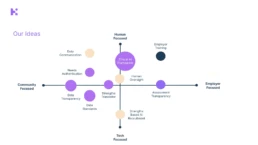
Using a design thinking exercise called Crazy Eights, members of the Back on Track community, PEAs, MMU, and the Noisy Cricket team brainstormed ideas. Each participant had eight minutes to come up with eight ideas, and ideas ranged from influencing employers and/or community members to focusing on either technology-driven or human-centered approaches.
The main themes included creating ethical AI frameworks for HI Future, being open about how data is used, and building a tool to help employers translate different strengths in practical examples. After voting on the ideas, with a focus on what the community members preferred, the group decided that employer training was the best solution.
Organising and Delivering Workshops
Along with planning agendas, organiSing activities, leading discussions, and capturing key points, the PEAs, MMU, and Noisy Cricket team worked hard to create a warm, welcoming, and safe space where community members felt comfortable participating.
Key actions included:
- Booking meeting spaces in familiar, well-lit locations and offering a range of hot and cold drinks as well as snacks to cater to different dietary needs and preferences. For the HI Future project, this meant reserving a room and arranging catering through Back on Track, which also helped support the charity financially.
- Sharing information about the next session’s time, date, and location at the end of each session. They sent reminders through Back on Track staff and followed up with more details by email or phone, using the communication method chosen by the participants during sign-up. This helped keep attendees informed and encouraged them to attend.
- Giving community members control by regularly asking for consent to take notes or photos at the start of each session. At the end of each workshop, participants were invited to reflect on what they learned and how they felt about the session. By choosing to join in, they gave their permission for their feedback to be recorded.
- Clearly setting expectations at the start of each session helped create a safe environment. This included agreeing on speaking rules (e.g., one person speaks at a time), how participants could signal they wanted to speak, making sure everyone had a chance to contribute, and managing time. The group also discussed what topics were appropriate to talk about in advance.
PEAs needed to stay present, pay close attention to each other and the community members, and ask questions or offer reflections to better understand different viewpoints. It was also important for them to remain flexible and open to any unexpected ideas or new directions that came up during the sessions.
To design the solution decided on in the community research phase of the HI Future project, Noisy Cricket teamed up with Purple Bonsai, a user research and learning design studio. The next step was to create a practical solution for people impacted by homelessness and employers involved in the HI Future project.
Back on Track’s community members recommended that employer training could help minimise the risks and maximise the rewards of using machine learning to support homeless employment. As a result, Purple Bonsai were encouraged design employer design which highlighted how impacted people’s data can be used in transparent, trustworthy and practical ways.
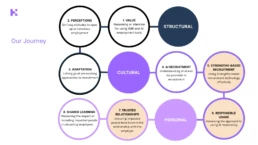
To figure out where employer training would be most effective, Noisy Cricket and Purple Bonsai first mapped out what the employer’s journey might be when considering using a strengths-based recruitment platform like HI Future. The journey highlighted how training would need to be valuable for employers while also having a positive impact on people experiencing homelessness.
Mapping the journey helped Noisy Cricket and Purple Bonsai realize that what’s most important is for employer’s to use strengths-based recruitment effectively and handle machine learning responsibly. They also found that building relationships between employers and job seekers affected by homelessness would need to be a fundamental part of employer training.
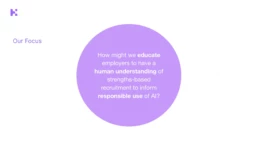
Using these three focus areas, the design question focused on educating employers about recruitment and AI ethics as well as building human connections with impacted people. ****Further research was then conducted with employers who were either interested in or already committed to creating diverse workplaces, using strengths-based recruitment or using AI to support employment.
Purple Bonsai worked with NHS recruitment teams and AI ethics experts to understand how these recruitment methods and tools were being used, how much training was currently available, and how well that training worked. However, participants were reluctant to disclose how much AI was currently being used in their hiring processes.
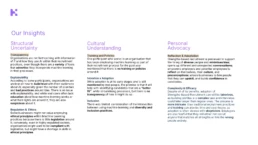
The research showed that a general lack of trust in AI and the absence of AI regulation made it difficult for people to understand how to use it responsibly, whether in recruitment or other areas. However, participants were more open to discussing strengths-based recruitment and its potential to help find candidates who are a better match for jobs. Some were also concerned that it could result in hiring the wrong people.
Despite interest in strengths-based recruitment, employers hadn’t thought about how they would need to change recruitment processes to make it work, especially when it comes to supporting disadvantaged or marginalised groups. While some companies offer general diversity training, specific training focused on AI, strengths-based recruitment or social mobility is uncommon.
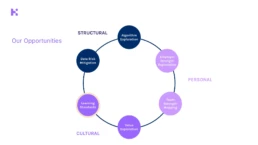
With the research highlighting that (1) making clear the benefits, (2) optimising learning and (3) immersing employers in the impact of experiencing homelessness on finding a job, we ran an exploration session with participating employers, ethicists and Back on Track community members to prioritise potential new approaches to employer training.
With a shared intention to avoid employers using machine learning to create a recruitment game, the group identified six opportunity areas for employment training. These establishing learning standards for machine learning-informed recruitment, mapping out how the machine learning data usage as well as evidencing impact of its usage on candidates and organisations.
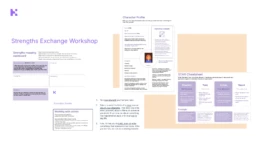
With no existing training to base a new design on, the group decided to create new learning standards for employer training. During an ideation session led by Purple Bonsai – where each individual generated eight ideas in just eight minutes – the group developed a plan for a Strengths Exchange Workshop.
Aiming to connect employers committed to social mobility with people impacted by homelessness who are ready to return to work, a series of interactive exercises were designed, including:
- Check-In Exercise: All participants take part in a group check-in to foster connection and build trust between potential candidates and employers.
- Strengths Exploration: Using Noisy Cricket’s Strengths Mapping Tool, participants identify three personal strengths and express them through writing, drawing, or modelling, sharing how these strengths appear in their lives and work.
- Reflection Exercise – Participants reflect on what they’ve learned so far to deepen their understanding of their strengths.
- Jobs Listing Exercise – After a short break, pairs (one candidate and one employer) collaborate to identifying the strengths needed – based on life and work experiences for an imaginary role.
- Strengths Review: Employers support candidates in reviewing their personal strengths using the STAR model, helping them understand how their unique strengths could be valuable in different roles or industries.
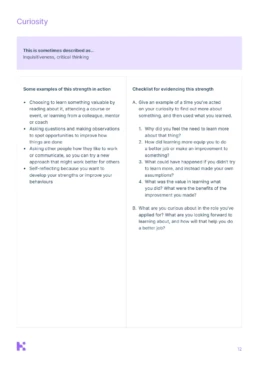
The Strengths Exchange Workshop is designed to build trust by establishing human relationships between candidates and recruiters. It also transparently shows how strengths-based data can help highlight a candidate’s practical skills for a new role or industry. This approach aligns with the ethical AI recommendations set by the Back on Track community as part of the PEAs in pods research.
By participating in the workshop, impact is achieved through candidates gain a better understanding of their potential in the workplace. while employers learn the value of considering more than just education, experience and formal skills when hiring. Once added as a training tool to HI Future, the workshop is expected to encourage responsible use of the Targeted Matchmaking Platform as a result of the personal connections created.
Compensating Communities
Community members were paid £15 per hour for their time using One4All vouchers, which could be spent online or in stores. Refreshments, including lunch for full-day sessions, were provided. Public transport costs were covered, and there was a budget for taxi expenses for people with disabilities who needed them to get to the venue.
Considering Ethics and Consent
In ensuring members of the community were taken care of, and that the data collected and used to to communicate was handled in line with data legislation (e.g. GDPR), MMU and Noisy Cricket worked with Back on Track to protect both the community members who choose to participate and academics in working with them.
MMU and Noisy Cricket ensured:
- Safeguarding and support measures were in place for the people participating in the research should they need support beyond the scope of the project
- Informed consent frameworks were utilised so that community members were clear on what the research involved, any potential benefits and risks as well as the right to withdraw from the research at any time
- Transparency and accountability through conversation and documentation around why the research was being conducted and how it will be used, plus managing expectations around the long-term aims of the project
- Inclusivity through reaching, engaging and balancing the voices of diverse groups, and that information shared and explored is relevant and accessible, as well as facilitation of voices is equitable, especially with marginalised groups
- Rigour in designing ongoing ethical research approaches and methodologies, to respect the social and cultural factors influencing communities, and considering potential biases which might influence the research process
- Reduction of risk through monitored research performance, from adhering to data privacy regulations and minimising unintentional harms to navigating complex situations and addressing power imbalances, to avoid legal issues and support academics in learning and evolving best practice
Exploring Power Dynamics
To help the academics better engage with people affected by homelessness throughout the HI Future Programme, Noisy Cricket held a series of workshops to help them understand how power and privilege shape our views on homelessness and employment.
The PEAs explored:
- Who is accountable and responsible for recruitment and AI ethics in the HI Future program, and who should be consulted and informed about its potential impacts during the Public Engagement Programme.
- Mapping their shared goals, objectives, and values in exploring the project, and any challenges or opportunities that could affect their ability to respond successfully.
- How to address the assumptions and ideas they developed about AI ethics in social mobility recruitment when working with people impacted by homelessness.
- Reflecting on the wants, needs, and hopes of people affected by homelessness in using machine learning to help them find jobs that match their strengths.
- What steps should be taken to make sure the community’s voice is central, trust is built, and value is created for the people involved in the HI Future Program.
Organising and Delivering Workshops
Along with planning agendas, organiSing activities, leading discussions, and capturing key points, the PEAs, MMU, and Noisy Cricket team worked hard to create a warm, welcoming, and safe space where community members felt comfortable participating.
Key actions included:
- Booking meeting spaces in familiar, well-lit locations and offering a range of hot and cold drinks as well as snacks to cater to different dietary needs and preferences. For the HI Future project, this meant reserving a room and arranging catering through Back on Track, which also helped support the charity financially.
- Sharing information about the next session’s time, date, and location at the end of each session. They sent reminders through Back on Track staff and followed up with more details by email or phone, using the communication method chosen by the participants during sign-up. This helped keep attendees informed and encouraged them to attend.
- Giving community members control by regularly asking for consent to take notes or photos at the start of each session. At the end of each workshop, participants were invited to reflect on what they learned and how they felt about the session. By choosing to join in, they gave their permission for their feedback to be recorded.
- Clearly setting expectations at the start of each session helped create a safe environment. This included agreeing on speaking rules (e.g., one person speaks at a time), how participants could signal they wanted to speak, making sure everyone had a chance to contribute, and managing time. The group also discussed what topics were appropriate to talk about in advance.
PEAs needed to stay present, pay close attention to each other and the community members, and ask questions or offer reflections to better understand different viewpoints. It was also important for them to remain flexible and open to any unexpected ideas or new directions that came up during the sessions.